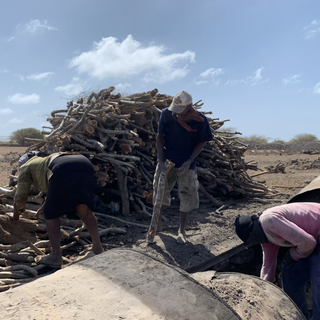Success is the journey, not the destination
- Ed

- Feb 28, 2021
- 4 min read
The start to the new year was a busy one. In January we received 2 weeks’ notice that the Cabo Verdean owners of our seemingly not-so-long-term rental had decided to pop back to Boa Vista for a holiday. Finding a new place just when we felt settled was an irritation to say the least, but the boys took it in their stride. It proved a winner as our new apartment overlooking (quite literally) the town beach of Praia Diante and backing onto the Sal Rei's historical favela epitomises Cabo Verde – vibrant, energetic, and oozing with character.
At the end of January as the wind and waves forecast looked up, we headed to Ervatao beach on the wild east coast for Boa Vista’s annual kite-surfing competition. Ed and a few others hired pick-ups, filled them with tents, wood, food, beer, grogue, more grogue, kite gear (and in Ed’s case his windsurf board), before setting out one Saturday morning. En-route we took a detour for lunch and a playdate at Spinguera, a delightful eco-lodge owned by Italian friends whose daughter Mariasole is in the same class as Zeb at school. It took two years of pain and toil restoring the foundations of a long-deserted fishing village to create this unique habitat – well worth the bumpy off-road ride!
Arriving on Ervatao the sense of community was palpable as everyone mucked in erecting tents, preparing food, and settling in for a night under the stars.
As the campfire roared, the boys roamed free - as did the grogue.
BBQ galinha (chicken) and arroz (rice) was followed by toasted marshmallows sourced after an hour of trying different shops in Sal Rei. Waking in the morning to a steady 25kt breeze, and head high swell, the Atlantic soon washed away any semblance of a hangover as Ed ventured out - the only windsurfer amongst dozens of kites - promptly landing his first decent jump in 20 years off the back of a 8-foot breaker. We returned to Sal Rei reinvigorated by the outdoors – or ‘pumped’ as Ed would say.
As February half-term fast approached, we contemplated the best way to entertain the boys for two-weeks. After little discussion, we decided to do an impetuous thing and booked a couple of internal flights from Boa Vista, via the capital Praia to the sleepy island of Maio. So was to start a period of intensely rewarding island-hopping.
As we entered the eerily quiet terminal building at Rabil airport, we were reminded of how we will never experience the joys of travel like this again. Once again, we were amongst just a handful of Cabo Verdeans flying from Boa Vista to the capital Praia, from whence we would take the super-short 12 minute flight onto Maio in an empty ATR-72 – or our own ‘private twin-prop’ as Zeb calls it.
It's often said that success is the journey, not the destination
Our expectations of Maio had perhaps been informed by an overly romantic presentation in guidebooks. We know few people, even Cabo Verdeans who have travelled to the easternmost outpost of Cabo Verde – often referred to as the ‘lost island’. It may be the familiar terrain (the island feels like an extension of both Sal and Boa Vista with its miles of sandy white, but more treacherous beaches) and our yearning for difference – but we found it hard to discover the charm and vibrancy we had so hoped for. The main town of Villa do Maio, now renamed Porto de Ingles (a nod to a merry band of Sir Francis Drake’s sailors who established the small fort here during the Napoleonic wars), is a pleasant enough backdrop from which to while away a few hours – but for us something just did not chime.
In a bid to shake off our negative overtones, we jumped in a pick-up for a tour of the island – taking in its many fine sandy beaches, stopping at numerous small villages, but we remained unimbued. Undoubtedly, we had lucked out with the half-price accommodation at Stella Maris – a small complex of villas perched atop a cliff over-looking the harbour. Had it not been for the infinity pool which kept the boys amused for hours we would have curtailed our trip sooner than we did.
The unequivocal highlight of our sojourn to Maio came late one afternoon whilst playing on the deserted town beach. Suddenly Ed spotted some splashes far out to sea and screamed at me to join him. Next thing I knew he was running along the shallows Zeb in his arms towards a small fishing boat. After exchanging a few words in Creole he and Zeb jumped in, leaving a confused me and a screaming Oz. I watched jealously as I realised he'd spotted a whale a few hundred metres offshore. From the beach they were so close to the humpback it looked as though its slapping tail would capsize the tiny boat.
Notwithstanding incredible encounters with wonders of the ocean, after a few days we yearned for something more. Looking into the once weekly flight from Maio back to Santiago we stumbled across a rather fabulous 20-minute connection to the island of Fogo – an active volcano which last erupted with little warning in 2014. We’d not planned to venture that far on this trip – but this was a once in a lifetime opportunity to take advantage of low-cost empty flights, plentiful accommodation, and explore regions which haven’t seen tourism for months.
It doesn’t excuse the carbon footprint, but it offsets it slightly knowing we are contributing something, no matter how little, to communities which appreciate it.
And so it was at 1130 on Friday 19 February we found ourselves once again aboard a private twin-prop headed to Fogo, by way of Praia, in search of Oz's dinosaurs.










































































Comments